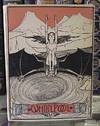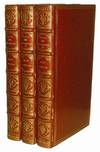
A Code of Gentoo Laws, or, Ordinations of the pundits, from a Persian Translation, made from the Original, written in the Shanscrit Language.
by HALHED, NATHANIEL BRASSEY (translator)
- Used
- Hardcover
- Signed
- first
- Condition
- See description
- Seller
-
Montreux, Switzerland
Payment Methods Accepted
About This Item
London:: s.n., 1776., 1776. 4to. lxxiv, 61, 322 pp. 8 engraved plates; minor damp-staining affecting first 20 pp., light foxing, offsetting from plates, title-rubbed at position of original date which is partly rubbed away. Modern quarter calf, marbled paper over boards, black leather spine label, subtle blind-stamping to spine. Ownership signature and bookplate (loose). Text: very good; binding: fine. First edition, with eight engraved plates, being an early English translation of Hindu jurisprudence. Nathaniel Brassey Halhed contributed a lengthy preface. Of added interest is a vocabulary compiled by the author and other elements: Hindoo months, names of authors cited within the legal code, and a list of books used for the compilation of laws. A curious inclusion here is a section devoted to a Hindu "account of the creation." What follows is a description of the necessary qualities of a Magistrate – seems more appropriate. / The list of laws is very odd to the modern eye, but I believe it has a lot more to do with the way of laws that prevail in that region of the world. The eastern way of thinking vs. the western (legal) mind is evident. The book is sectioned into twenty chapter detailing different criminal or legal concerns: Of lending & borrowing; Of the division of inheritable property; Of justice; Of trust or Deposit; Of selling a stranger's property; Of Shares; Of Gift; Of Servitude; Of Wages; Of Rent & Hire; Of Purchase & Sale; Of Boundaries & Limits; Of Shares in the Cultivation of Lands; Of Cities and Towns, and of the Fine for Damaging a Crop; Of Scandalous & Bitter Expressions; Of Assault; Of Theft; Of Violence; Of Adultery; Of what concerns Women; Of Sundry Articles [gaming, lost items, fine for cutting trees, tax on sales, quarrels within family, serving unclean victuals (food), punishment inflicted on a Soder; punishment, Of adoption…]. / The law here is situational and totally determined on social status. It is difficult to see that any crime ‘fits' what is written, but rather it seems to record a president and then it is considered as an authority for later crimes – similarly so in the west, but here the punishments are remarkable: if one elopes with a girl, "If a Man steals away a Girl of a superior Cast to commit Adultery with her, the Magistrate shall put him to Death." [p.279]. In one of many examples of assault, the punishment for an instance where flesh is torn, bone is broken, blood-shed, "the Magistrate shall confiscate all his Goods, and banish him [from] the Kingdom." [p.231]. Adultery brings a wide range of remarkable punishments, all caste oriented: "If the wife of a Brmin, by her own consent, commits adultery with a Soder, the Magistrate shall cut off the Hair of her Head, anoint her Body with Ghee, and cause her to be led through the whole City naked, and riding upon the Ass [donkey], and cast her out on the North Side of the City, or cause her to be eaten by Dogs." [p.275]. Section VIII (pp. 280-81) even offers punishment for a man who has a "carnal conjunction of a man with any beast." In the end, if the city is entirely clean of all evils, then the Magistrate shall go "to Paradise, and his Kingdom is doubled, and his Reputation is increased." The fact that gaming and wagering is included is interesting in that 18th century British treatises were also written on the subject: here it is just 3 pages of text and no math. / Nathaniel Brassey Halhed (1751–1830) was an English Orientalist and philologist. He was born in Westminster and educated at Harrow, then at Christ Church, Oxford, where is met the great Sir William Jones. Jones was the leading English Orientalist of his day and he was very active in his writings. He introduced Arabic to Halhed that garnered him a position writing for the East India Company. From this point Halhed went to India and translated this legal document from a Persian language version of the original text that was in Sanskrit. Later he returned to England and became a member of Parliament. On his death in 1830 Halhed's collection of oriental manuscripts was sold to the British Museum. PROVENANCE: This copy made it to America by the early nineteenth century. The letter (or dedication) to Warren Hastings page is also signed by a previous owner, William Parkinson, bought in New York, Febr. 12, 1839. Bookplate of the Library of the American Bible Union, 1841; and pencil signature of John C. Murphy, New York. REFERENCES: STC T112179.
Reviews
(Log in or Create an Account first!)
Details
- Bookseller
- Jeff Weber Rare Books
(CH)
- Bookseller's Inventory #
- MEE1120
- Title
- A Code of Gentoo Laws, or, Ordinations of the pundits, from a Persian Translation, made from the Original, written in the Shanscrit Language.
- Author
- HALHED, NATHANIEL BRASSEY (translator)
- Book Condition
- Used
- Binding
- Hardcover
- Publisher
- s.n., 1776.
- Place of Publication
- London:
- Date Published
- 1776
- Keywords
- Persia
Terms of Sale
Jeff Weber Rare Books
30 day return guarantee, with full refund including shipping costs for up to 30 days after delivery if an item arrives misdescribed or damaged.
About the Seller
Jeff Weber Rare Books
Biblio member since 2006
Montreux
About Jeff Weber Rare Books
Visitors are welcome to the shop. Call ahead for an appointment if you wish to meet with me. On display are about 12,000 books.
Glossary
Some terminology that may be used in this description includes:
- Marbled Paper
- Decorative colored paper that imitates marble with a veined, mottled, or swirling pattern. Commonly used as the end papers or...
- Fine
- A book in fine condition exhibits no flaws. A fine condition book closely approaches As New condition, but may lack the...
- Spine Label
- The paper or leather descriptive tag attached to the spine of the book, most commonly providing the title and author of the...
- First Edition
- In book collecting, the first edition is the earliest published form of a book. A book may have more than one first edition in...
- Calf
- Calf or calf hide is a common form of leather binding. Calf binding is naturally a light brown but there are ways to treat the...
- Bookplate
- Highly sought after by some collectors, a book plate is an inscribed or decorative device that identifies the owner, or former...
- New
- A new book is a book previously not circulated to a buyer. Although a new book is typically free of any faults or defects, "new"...













